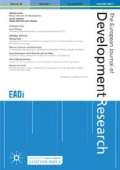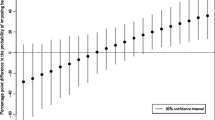Abstract
Rebuilding health systems in post-conflict countries has the financial and technical support of key actors in international development, such as the World Bank or the World Health Organization. This support helps to influence the process of formulating and implementing public health policies. In Afghanistan, two factors contributed to increase the influence of major stakeholders: first, the institutional legacy of the war years, and second, the positioning of actors on the national and international scene. The absence of modern institutions, the ‘institutional vacuum’, that characterizes the country in 2001, the predominance of the World Bank on the international stage and the lack of any real counterbalance on a national level have contributed to the development of a primary health-care system based on contracting out services.
Abstract
La reconstruction des systèmes de santé dans les pays en sortie de crise bénéficie du soutien financier et technique des principaux acteurs internationaux du développement, tels que la Banque Mondiale ou l’Organisation Mondiale de la Santé. Ce soutien contribue à influencer le processus d’élaboration des politiques publiques de santé. En Afghanistan, le degré de cette influence a été le produit de deux facteurs: d’une part, l’héritage institutionnel des années de guerre, et d’autre part, le positionnement des acteurs sur la scène nationale et internationale. L’absence d’institutions modernes, le « vide institutionnel », qui caractérise le pays en 2001, la prédominance de la Banque Mondiale sur la scène internationale, et l’insuffisance de contrepoids ont ainsi contribué à la mise en place d’un système de santé primaire basé sur la contractualisation des services.
Similar content being viewed by others
References
Afghan Authority for the Coordination of Assistance. (2002) The National Development Framework: Draft – For Consultation (Version 2). Kabul, Afghanistan: Afghan Authority for the Coordination of Assistance.
Ahmad, K. (2000) Taliban plans purge of doctors and paramedics from Afghanistan. The Lancet 355 (9197): 50.
Alonso, A. and Brugha, R. (2006) Rehabilitating the health system after conflict in East Timor: A shift from NGO to government leadership. Health Policy and Planning 21 (3): 206–216.
Bachardoust, R. (2002) Afghanistan: Droit constitutionnel, histoire, régimes politiques et relations diplomatiques depuis 1747. Paris, France: L’Harmattan.
Béland, D. (2005) Ideas and social policy: An institutionalist perspective. Social Policy and Administration 39 (1): 1–18.
Berman, P.A. and Bossert, T.J. (2000) A decade of health sector reform in developing countries: What have we learned? In: Data for Decision Making Project (eds.) Appraising a Decade of Health Sector Reform in Developing Countries, Proceedings of the Data for Decision Making Project; 15 March, Washington, DC: Harvard School of Public Health, pp. 1–20.
Blood, P.R. (1997) Afghanistan. U.S. Library of Congress, Federal Research Division's Area Handbook/Country Studies Series. Washington, DC: U.S. Library of Congress.
Bornemisza, E. and Sondorp, E. (2002) Health Policy Formulation in Complex Political Emergencies and Post-Conflict Countries: A Literature Review. London: London School of Hygiene and Tropical Medicine.
Bustreo, F., Genovese, E., Omobono, E., Axelsson, H. and Bannon, I. (2005) Improving Child Health in Post-Conflict Countries: Can the World Bank Contribute? Washington, DC: The World Bank.
Buwa, D. and Vuori, H. (2006) Rebuilding a health care system: War, reconstruction and health care reforms in Kosovo. European Journal of Public Health 17 (2): 226–230.
Central Statistics Office and Unicef. (2003) Moving Beyond 2 Decades of War: Progress of Provinces. Multiple Indicator Cluster Survey. Kabul, Afghanistan: Central Statistics Office.
Critique Internationale. (2004) Militant de la démocratie. Entretien avec Guy Carcassonne, 15 Juin, pp. 177–192.
De Beyer, J.A., Preker, A.S. and Feachem, R.G.A. (2000) The role of the World Bank in international health: Renewed commitment and partnership. Social Science and Medicine 50 (2): 169–176.
Faiz, A. (1997) Health care under the Taliban. The Lancet 349 (9060): 1247–1248.
Haut Conseil De La Coopération Internationale. (2005) Les acteurs français dans le ‘post-conflit’ – Rapport de la Commission ‘Crises, prévention des crises et reconstruction. présidée par Michel Brugière, directeur général de Médecins du monde. Haut conseil de la coopération internationale: Paris, France.
Islamic Government of Afghanistan. (2003) A Basic Package of Health Services for Afghanistan. Kabul, Afghanistan: Ministry of Health.
Jann, W. and Wegrich, K. (2007) Theories of the policy cycle. In: F. Fischer, J.M. Gerald and S.S. Sidney (eds.) Handbook of Public Policy Analysis: Theory, Politics, and Methods. Boca Raton, FL: CRC Press Taylor & Francis Group, pp. 43–62.
Joint Donor Mission. (2001) Joint Donor Mission to Afghanistan on the Health, Nutrition, and Population Sector Aide-Memoire. Washington, DC: World Bank.
Kingdon, J.W. (1995) Agendas, Alternatives, and Public Policies. New York: HarperCollins College Publishers.
Kruk, M.E., Freedman, L.P., Anglin, G.A. and Waldman, R.J. (2009) Rebuilding health systems to improve health and promote statebuilding in post-conflict countries: A theoretical framework and research agenda. Social Science and Medicine 70 (1): 89–97.
Lanjouw, S., Macrae, J. and Zwi, A.B. (1999) Rehabilitating health services in Cambodia: The challenge of coordination in chronic political emergencies. Health Policy and Planning 14 (3): 229–242.
Lasswell, H.D. (1956) The Decision Process: Seven Categories of Functional Analysis. College Park, MD: University of Maryland Press.
Lecours, A. (2002) L’approche néo-institutionnaliste en science politique: unité ou diversité? Politique et Sociétés 21 (3): 3–19.
Liu, X., Hotckiss, D.R. and Bose, S. (2008) The effectiveness of contracting-out primary health care services in developing countries: A review of the evidence. Health Policy and Planning 23 (1): 1–13.
Loevinsohn, B. and Harding, H. (2005) Buying results? Contracting for health service delivery in developing countries. The Lancet 366 (9486): 676–681.
Macrae, J. (1997) Dilemmas of legitimacy, sustainability, and coherence: Rehabilitating the health sector. In: K. Kumar (ed.) Rebuilding Societies after Civil War: Critical Roles for International Assistance. London: Lynne Rienner Publishers, pp. 183–201.
Macrae, J., Zwi, A. and Forsythe, V. (1995) Aid policy in transition: A preliminary analysis of ‘post’ conflict rehabilitation of the health sector. Journal of International Development 7 (4): 669–684.
Mayntz, R. and Scharpf, F.W. (2001) L’institutionnalisme centré sur les acteurs. Politix 14 (55): 95–123.
Mills, A. (1998) To contract or not to contract? Issues for low and middle income countries. Health Policy and Planning 13 (1): 32–40.
Mills, A., Bennett, S. and Russell, S. (2001) The Challenge of Health Sector Reform. What Must Governments Do? Basingstoke, UK: Palgrave.
Palmer, N., Strong, L., Wali, A. and Sondorp, E. (2006) Contracting out health services in fragile states. British Medical Journal 332 (7543): 718–721.
Polidano, C. (1999) The New Public Management in Developing Countries: IDPM Public Policy and Management Working Paper. Manchester: University of Manchester. Institute for Development Policy and Management.
Reich, M.R. (1995) The politics of health sector reform in developing countries: Three cases of pharmaceutical policy. Health Policy 32 (1): 47–77.
Ridde, V. (2005a) Building trust or buying results? The Lancet 366 (9498): 1692.
Ridde, V. (2005b) Performance-based partnership agreements for the reconstruction of the health system in Afghanistan. Development in Practice 15 (1): 4–15.
Roberts, B., Guy, S., Sondorp, E. and Lee-Jones, L. (2008) A basic pakage of health services for post-conflict countries: Implications for sexual and reproductive health services. Reproductive Health Matters 16 (31): 57–64.
Rotberg, R.I. (2002) The new nature of nation-state failure. The Washington Quaterly 25 (3): 85–96.
Rubin, B.R. (1988) Lineages of the state in Afghanistan. Asian Survey 28 (11): 1188–1209.
Rubin, B.R. (1999) Afghanistan under the Taliban. Current History 98 (625): 79–91.
Rubin, B.R. (2002) A blueprint for Afghanistan. Current History 101 (654): 153–157.
Sabatier, P.A. (2007) Theories of the Policy Process, 2nd edn. Boulder, CO: Westview Press.
Sen, K. and Koivusalo, M. (1998) Health care reforms and developing countries: A critical overview. International Journal of Health Planning and Management 13 (3): 199–215.
Serre, M. and Pierru, F. (2001) Les organisations internationales et la production d’un sens commun réformateur de la politique de protection maladie. Lien social et Politiques 1 (45): 105–128.
Shuey, D.A., Qosaj, F.A., Schouten, E.J. and Zwi, A.B. (2003) Planning for health sector reform in post-conflict situations: Kosovo 1999/2000. Health Policy 63 (3): 299–310.
Sondorp, E. (2004) Case Study 1: A Time-Seried Analysis of Health Service Delivery in Afghanistan. London: DFID Health Systems Resource Centre.
Strong, L., Wali, A. and Sondorp, E. (2005) Health policy in Afghanistan: Two Years of Rapid Change. A Review of the Process from 2001 to 2003. London: London School of Hygiene and Tropical Medicine.
Suhrke, A. (2006) The limits of statebuilding: The role of international assistance in Afghanistan. In: International Studies Association Annual Meeting, Proceedings of the 21–24 March, San Diego. Lund Universitet: ISA.
Thelen, K. (1999) Historical institutionalism in comparative politics. Annual Review of Political Science 2 (1): 369–404.
Travis, H. (2005) Freedom or theocracy? Constitutionalism in Afghanistan and Iraq. Northwestern University Journal of International Human Rights 3 (4): 1–52.
Tulloch, J. et al (2003) Initial Steps in Rebuilding the Health Sector in East Timor. Washington, DC: The National Academies Press.
Waldman, R. and Hanif, H. (2002) The Public Health System in Afghanistan: Current Issues. Issues Paper Series Kabul, Afghanistan: Afghanistan Research and Evaluation Unit.
Walt, G. (1994) Health Policy: An Introduction to Process and Power. Johannesburg, South Africa: Witwatersrand University Press.
Walt, G. and Gilson, L. (1994) Reforming the health sector in developing countries: The central role of policy analysis. Health Policy and Planning 9 (4): 353–370.
World Bank. (1993) Investing in Health. World Development Report 1993, New York: Oxford University Press.
Zivetz, L. (2006) Health Service Delivery in Early Recovery Fragile States: Lessons from Afghanistan, Cambodia, Mozambique, and Timor-Leste. Arlington, VA: United States Agency for International Development (USAID).
Zwi, A.B. and Grove, N.J. (2006) Challenges to human security: Reflections on health, fragile states and peacebuilding. In: A. Mellbourn (ed.) Health and Conflict Prevention. Hedemora, Sweden: Gidlunds Förlag, pp. 119–137.
Acknowledgements
L'auteure est candidate au Ph.D. Santé publique de l'Université de Montréal et est financée par le Programme stratégique de formation en recherche en santé mondiale, un partenariat des Instituts de recherche en santé du Canada et du Réseau de recherche en santé des populations du Québec. L'auteure remercie Nicole Bernier et Valéry Ridde de l'Université de Montréal, ainsi que les réviseurs anonymes, pour leurs précieux commentaires.
Author information
Authors and Affiliations
Rights and permissions
About this article
Cite this article
Robert, E. Politiques publiques de santé dans les pays en sortie de crise et influence de la communauté internationale: la reconstruction du système de santé primaire dans l’Afghanistan post-conflit. Eur J Dev Res 24, 169–185 (2012). https://doi.org/10.1057/ejdr.2011.27
Published:
Issue Date:
DOI: https://doi.org/10.1057/ejdr.2011.27




